Simon Atherton
Simon Tuttle Atherton (May 19, 1803 - October 7, 1888) [1] was an early American Shaker, who became highly successful on behalf of his own community,[2] in selling herbs in and around Boston.
Early years
He was born in Shirley, Massachusetts, the son of Jonathan Atherton [3] and Rhoda Heald. The youngest of six children. His father died when he was 6 months old. He was admitted in 1808, at just five years of age, along with his sister, Sylvia, into the Harvard Shakers.[4] His other sister Nancy was sent to another Shaker community.
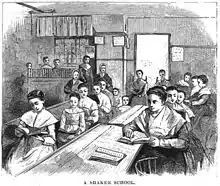
Life as a Shaker
The Shaker community in Harvard, Massachusetts began when a group of dissenters from the local state-funded church, left and set up the "Square House", having affiliated themselves with Mother Ann Lee, the founder of the Shaker denomination, when she visited Harvard, Massachusetts. After 1821, there was no one single leader, but rather a small nucleus of ministry elders and eldresses with authority over all the Shaker villages, each with their own teams of elders and eldresses who were subordinate to the Ministry.[5]
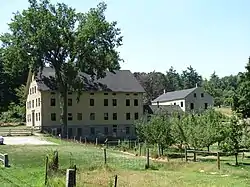
Atherton would have been referred to within this community as “Brother Simon Atherton”. However he was elevated to a ministry level, as “Elder Atherton”, a trusted leader within the community.
Trustee of the Shaker Society
He served as trustee in the community in Harvard for over 50 years from 1838 to 1888. He borrowed the saying:
“A good name is better than riches”
and used it as his motto for the communities herb industry, which is quoted, even today, on the Shaker Workshops page.[6]
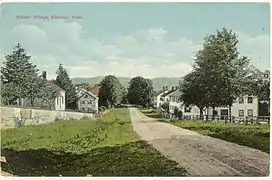
Dealer in Medicinal Herbs
Atherton was a dealer in medicinal herbs for the Shaker Society. The Shaker day journals during his era recorded his efforts “Simon goes to Boston.”
By 1835 the herb industry in Harvard was a major business. In order to support demand, the Harvard Shakers constructed a Herb Drying House in 1848 and a Herb Barn in 1849.
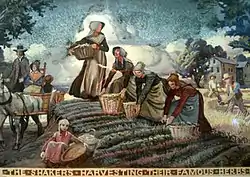
Efficient production, drying, and marketing of high-quality herbs resulted in worldwide sales of over 18 tons in 1855. Atherton is credited with building up their seed business. Membership of the community was vital to such expansion and during Atherton’s time in this community membership went on to peak at 200 in the 1850s.[7]
Atherton had become a renowned Shaker businessman who promoted his community to outsiders, with his medicinal herbs whilst in Boston, and would spend at least two days a week at the Massachusetts State House representing the Shaker’s business interests. He lodged at Boston’s Quincy House for many years and was regarded as a regular boarder.
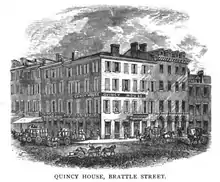
Personal
His sister, Sylvia Atherton (1801-1866) lived in the same Shaker community in Harvard.[8] However, his elder sister, Nancy Atherton (1797-1873) was admitted to the shaker community in Shirley, where became a seamstress, and is buried in the Shirley Shaker Cemetery.[9]
Death
Atherton died on October 7, 1888, at the age of 85. He is buried at the Shaker Burying Ground in Harvard. [10]
Legacy
He is listed in the A-Z of Shakers as a “notable shaker”.,[5] along with Tabitha Babbitt, Grove Blanchard, Elijah Myrick, William Leonard, Augustus Grosvenor, Roxalana Grosvenor, Olive Hatch, Hannah Kendal and Annie Walker.
Ancestry
He was the third generation of Atherton’s to have resided in Shirley, Massachusetts, His grandfather Amos married Lydia Gould of Shirley in 1758.[11] Prior to that his paternal ancestors had resided in Lancaster, Massachusetts having been pioneer settlers to the area. He is a direct descendant of James Atherton,[12] who arrived in Dorchester, Massachusetts, in the 1630s.[13] The Atherton family ancestry originated from Lancashire, England.
See also
Further reading
References
- "Atherton One Name Study - Entry for Simon T Atherton".
- "Historical dictionary of the Shakers".
- "Atherton One Name Study - Entry for his father, Jonathan Atherton".
- Paterwic, Stephen J. (15 June 2017). Historical dictionary of the Shakers: Biography of Simon Atherton. ISBN 9781538102312.
- Paterwic, Stephen J. (September 28, 2009). The A to Z of the Shakers. Scarecrow Press. ISBN 9780810870567.
- "Elder Atherton's favorite and memorable saying "A good name is better than riches"".
- "Harvard History - includes a picture of Simon Atherton".
- Sylvia Atherton at Find a Grave
- Nancy Atherton at Find a Grave
- Simon Atherton at Find a Grave
- Chandler, Seth (1883). "History of the town of Shirley, Massachusetts, from its early settlement to A.D. 1882 (contains Simon Atherton's genealogy)". pp. 344–345.
- "James Atherton entry on the Atherton ONS".
- "James Atherton of Dorchester settled in Lancaster Massachusetts in 1654".
- Horgan, Edward R (1982). The Shaker Holy Land. ISBN 9780916782221.
- Miller, Stephen M (2007). From Shaker Lands and Shaker Hands: A Survey of the Industries. ISBN 9781584656296.